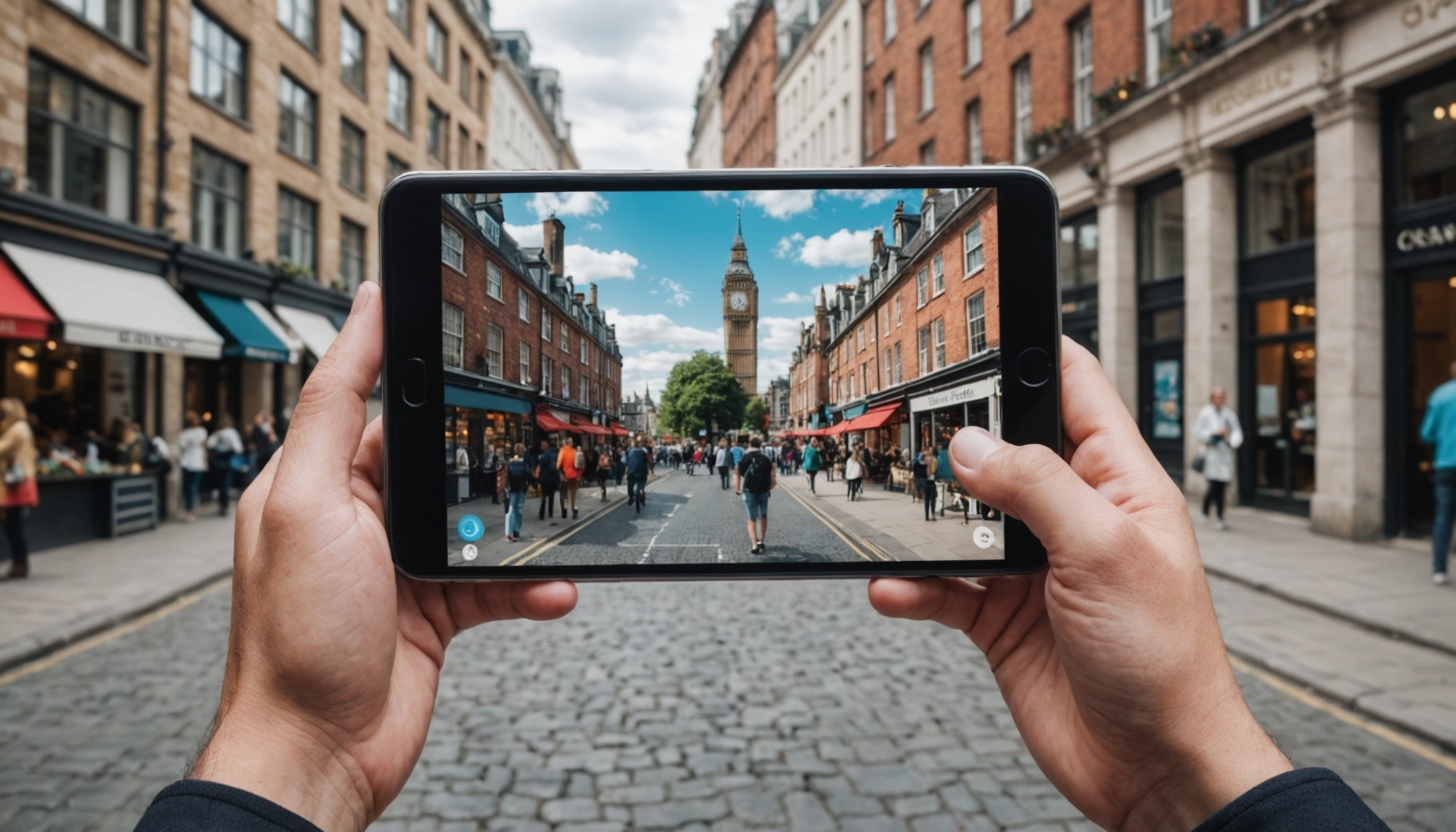Transforming Trip Planning: The Power of Augmented Reality for UK Travel Agencies
In the ever-evolving landscape of the travel industry, technology is playing an increasingly pivotal role in how we plan, experience, and interact with our travels. One of the most exciting and transformative technologies in this realm is Augmented Reality (AR). For UK travel agencies, AR is not just a novelty but a game-changer that can enhance customer experiences, streamline travel planning, and set them apart in a competitive market.
The Rise of Augmented Reality in Travel
Augmented Reality is no longer a concept of the future; it is here and it is revolutionizing the way we travel. Unlike Virtual Reality (VR), which immerses users in a completely digital environment, AR enhances the real world by overlaying digital information onto physical surroundings. This technology is particularly appealing in the travel industry because it can be accessed using everyday devices like smartphones and tablets, making it more accessible and cost-effective than VR.
Also to see : Top Strategies for Strengthening Cybersecurity in UK Government Agencies
Enhancing Travel Planning with AR
Travel planning is one of the most critical aspects of the travel experience, and AR is transforming this process in several innovative ways.
Virtual Tours Before You Go
AR allows travelers to take virtual tours of destinations, hotels, and landmarks before making a booking. This feature is particularly popular, with a Statista study indicating that 70% of travelers prefer using AR for virtual tours before choosing a destination. Travel apps equipped with AR can provide 360-degree views of potential destinations, allowing users to explore and interact with the environment in a highly immersive way.
In the same genre : Discover the benefits of vallourec smart tubular solutions
Real-Time Navigation Assistance
Once travelers arrive at their destination, AR can continue to enhance their experience. AR apps can provide real-time navigation assistance, guiding travelers through unfamiliar cities and landmarks. These apps can overlay digital information such as directions, historical facts, and local data directly onto the physical environment, making navigation more intuitive and informative.
Cultural Exploration
AR is also enriching cultural experiences by providing interactive and educational content. For instance, AR tours can overlay historical facts and local data onto physical sites, offering a deeper understanding of the cultural and historical significance of the places visited. This not only enhances the travel experience but also makes it more educational and engaging.
Practical Applications for UK Travel Agencies
UK travel agencies can leverage AR in various ways to improve their services and attract more customers.
Personalized Experiences
By integrating AR into their booking platforms, travel agencies can offer personalized experiences tailored to individual preferences. For example, an AR app could suggest local attractions and activities based on a traveler’s interests and previous travel history.
Interactive Marketing
AR can be a powerful marketing tool. Travel agencies can create AR experiences that allow potential customers to interact with destinations in a more engaging way. This could include virtual tours of hotels, restaurants, or local landmarks, all accessible through a smartphone app.
Enhanced Customer Service
AR can also improve customer service by providing real-time assistance. For instance, an AR app could help travelers find their way around an airport or a new city, or provide instant translations of street signs and menus.
Examples and Case Studies
To illustrate the potential of AR in the travel industry, let’s look at a few examples:
AR Tours in Museums
While not directly related to travel agencies, the use of AR in museums provides a compelling example of its potential. For instance, the “Loot: 10 Stories” exhibition at the Mauritshuis in The Hague used VR to transport viewers to historical sites, but AR could similarly be used to enhance museum visits by providing interactive and educational content in real-time.
Virtual Reality Travel Search and Booking
Some travel companies are already using VR to allow customers to experience destinations before booking. AR can take this a step further by integrating these experiences into the real world. For example, a travel agency could offer an AR tour of a hotel room, allowing customers to see the room’s layout and amenities in real-time.
Market Dynamics and Growth
The integration of AR into the travel industry is part of a broader digital transformation driven by consumer demand for more personalized, accessible, and technologically advanced services.
Mobile AR Market Growth
The mobile AR market is expected to grow significantly, from $21 billion in 2023 to $36.2 billion by 2026. This growth indicates a strong consumer interest in AR technology and its potential applications in various industries, including travel.
Online Travel Agencies (OTAs)
OTAs are at the forefront of this digital transformation. By integrating AR, virtual tours, and AI-driven chatbots, OTAs are enhancing the booking experience, making it more immersive and personalized. This trend is expected to continue, with the global OTA market projected to grow at a compound annual growth rate (CAGR) of 6.74% from 2023 to 2033.
Table: Comparing AR and VR in Travel
| Feature | Augmented Reality (AR) | Virtual Reality (VR) |
|---|---|---|
| Device Requirements | Smartphones, tablets, AR glasses | VR headsets |
| Cost | Generally cheaper | More expensive |
| Accessibility | Widely accessible | Limited by hardware availability |
| Usage | Enhances real-world environment | Immerses users in a digital environment |
| Travel Planning | Virtual tours, real-time navigation | Virtual tours, immersive destination experiences |
| Customer Interaction | Interactive and educational content in real-time | Immersive but less interactive with real-world surroundings |
| Market Growth | Expected to grow to $36.2 billion by 2026 | Growing but slower due to hardware costs |
Quotes from Industry Experts
- “AR makes these possibilities a reality. Beyond enhancing the typical tourist experience, AR is revolutionizing how we plan, navigate, and enjoy our trips, providing a seamless blend of the digital and physical worlds.” – [Inspiring Ways Augmented Reality is Transforming our Travel Experiences]
- “With this history of very unequal relationships and sometimes heartbreaking stories, it’s really important to pull the viewer out of the typical museum context.” – Eline Jongsma, guest curator for “Loot: 10 Stories” exhibition
- “The integration of AR, virtual tours, and AI-driven chatbots is enhancing the booking experience, making it more immersive and personalized.” – [How OTAs Are Revolutionizing Travel Plans in the UK]
Practical Insights and Actionable Advice for Travel Agencies
For UK travel agencies looking to leverage AR, here are some practical insights and actionable advice:
Invest in App Development
Developing AR-enabled apps can be a significant investment, but it offers a high return in terms of customer engagement and satisfaction. Consider partnering with app development companies that specialize in AR technology.
Focus on User Experience
Ensure that the AR experiences you offer are intuitive and user-friendly. Conduct user testing to gather feedback and improve the app’s functionality.
Integrate with Existing Services
AR should not be a standalone feature but an integral part of your overall service offering. Integrate AR with your booking platforms, customer service, and marketing strategies.
Educate Your Customers
Not all customers may be familiar with AR technology. Provide tutorials and guides on how to use AR features within your apps to ensure maximum adoption.
Monitor Market Trends
Keep an eye on market trends and consumer preferences. The travel industry is highly competitive, and staying ahead of the curve in terms of technology can be a significant differentiator.
Augmented Reality is not just a trend; it is a transformative force in the travel industry. For UK travel agencies, embracing AR can mean offering more personalized, interactive, and informative experiences to their customers. As the technology continues to evolve, it promises to change the way we explore the world, bringing digital enhancements to every step of the journey.
By understanding the potential of AR, investing in its development, and integrating it seamlessly into their services, travel agencies can not only enhance customer experiences but also position themselves at the forefront of the digital transformation in the travel industry. Whether it’s through virtual tours, real-time navigation, or enhanced cultural exploration, AR is set to revolutionize trip planning and travel experiences in ways that are both exciting and transformative.











